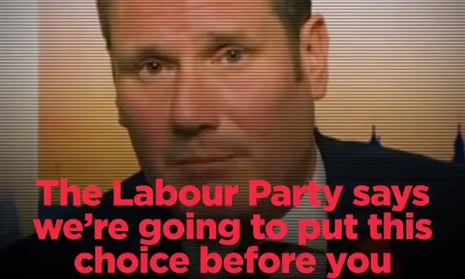We’re now well into the “phoney war” period of the election – where on the surface all seems calm. Parliament has been prorogued, there have been a few early jabs, and a consensus is already beginning to emerge about how everything will play out online.
The conventional wisdom suggests this election will be all about digital wizardry. On Facebook the parties will use sneaky, microtargeted adverts to send bespoke messages to hundreds of precise demographics. On Twitter competing armies of bots will spread their messages, amplifying the side they support while drowning their opponents in bile. And Russian interference will ramp up, with targeted hacks and weaponised disinformation being used to sow generalised discord and political chaos.
Except the consensus is wrong. This election won’t be like the 2017 election, and it certainly won’t be like the US’s 2016 election. Some of the new weirdness is already visible; some of it is looming on the horizon. But much of it won’t be recognisable at all until well after the votes are counted.
Here’s what we can say: there is no evidence of any foreign interference in the election to date; no evidence of anything approaching hyper-focused ads targeting a specific subset of the population; and when there are Twitter bots, they’re generally trying to tempt you to sign up for escort sites with stolen nudes or encourage you to take advantage of this “one weird trick” to make millions from bitcoin.
We know some of this because tech companies have stepped up their game in the past two years. Praising Facebook doesn’t come naturally to me, but the social network is being proactive and helpful to a degree that could quite possibly have changed world history if it had started in 2016. For instance, Nathaniel Gleicher, the company’s head of cybersecurity policy, is actively sharing updates about suspicious activity. “This team has not seen evidence of widespread foreign operations aimed at the UK,” he said last week. “But we remain proactive.”
Twitter is going even further: the company now shares the full details of foreign interference when it finds it, allowing journalists and researchers to download entire archives of tweets sent by Russian, Chinese and Iranian actors. Again, they’ve discovered nothing aimed at disrupting the UK election.
And both companies have archives of political ads. Twitter’s is tiny, mostly because no one bothered to run political ads on Twitter, even before the company announced it would ban the whole field later this month. But Facebook’s is fairly huge, and reveals some – not enough, but some – details of what the various actors are doing in this election.
And the answer is, well, dull – at least so far. The Tories are advertising to marginal constituencies, telling them how marginal they are. Labour is advertising everywhere about “protecting the NHS”. The Liberal Democrats are pushing their “stop Brexit” message, and promising to invest a disputed £50bn “remain bonus” in childcare, mental health care, new teachers and the climate crisis. Oh, and the Woodland Trust is spending a grand a day promoting trees. I’m not sure trees needed a PR blitz, but here we are.
But we are already starting to get a sense of some of the idiosyncrasies that will characterise this election. One is the exploitation, accidentally or not, of the fact that a message is relayed just as effectively by an unintentional carrier as a supporter. At the extreme end, this is the Conservative party’s campaign of the pseudo-shitposts: woke millennials won’t retweet a slickly produced poster saying “get Brexit done”, but you can be damn sure they’ll share something with the same message far and wide if it looks like it was knocked up by an intern with a pirated copy of Microsoft Word. Sure, they’re laughing at it, but the message is the message regardless.
This kind of trolling has diminishing returns; it’s more reliable to fish among journalists hungry for stories. Pay £500 to promote an advert on Facebook and it’ll be seen by around 50,000 people. Pay £500 to promote an advert on Facebook but give it a whiff of scandal, and it’ll be on the front page of BBC News, seen by millions. That’s what happened when Facebook did not classify a back-of-the-envelope calculation for the “tax bill” of a Corbyn government as a political advert. The BBC spotted it after 16 viewers sent it in, and the rest was history. Would it be conspiratorial to suggest that some of those 16 could have been less than impartial about ensuring the advert was more widely noticed? Yes, it would.
Facebook has helpfully decided that its British factchecking partners – two organisations that factcheck politicians’ claims – won’t be allowed to factcheck the claims of politicians. So outright information should be a fertile field for parties to plough in this election.
But the Conservatives’ first attempt, a campaign video posted to Twitter that had been misleadingly edited to imply that Keir Starmer didn’t have a reply to a question about Labour’s Brexit position, may have backfired enough to keep them from trying it again.
Even the Liberal Democrats, who have produced dodgy leaflets declaring that their biggest local rival “can’t win here, have started to experience a backlash to this resolutely offline form of misinformation. Misleading digital charts are unlikely to prove more successful.
Other aspects of our bizarre online existence make it hard to gauge the impact of digital high jinks. The relative decline of Facebook use in Britain since 2017 has been offset by an increase in WhatsApp use - all neutral for Facebook (or should that be FACEBOOK?), of course, since the company owns both services. But how it will affect the campaign remains to be seen. The culture of WhatsApp in Britain is markedly different from its usage in India and Brazil – the two countries where significant electoral outcomes have been attributed to misinformation shared on the app. Brits, by and large, don’t forward massive amounts of material like Indians, and don’t tend to be in huge broadcast channels like Brazilians.
Equally unpredictable are the local and hyper-local Facebook groups that are replacing a significant chunk of Britain’s shuttered local presses. While they may share the cadence of a free-for-all chatroom, each of these groups has an admin – usually just the person who set the group up – and the power they exert can be significant. If your local paper skewed significantly in favour of a particular candidate, you’d probably notice. Would you spot the same if the admin of the group for your postcode was silently deleting posts critical of the opposition?
I could go on. There are probably a hundred independent influencers on Instagram, a hundred more on YouTube and more again on Twitch, who could each shift a thousand youth votes if they put their minds to it. And what about the conversations happening on TikTok, Reddit,Pinterest, Ravelry and SomethingAwful?
At a certain point, trying to nail down the online election becomes as impossible a task as trying to nail down the offline one. All we can do is keep our eyes on the screen, our ears to the podcast, and our RSI-addled wrists on the keyboard, and wait for it all to be over in five blessed weeks.

